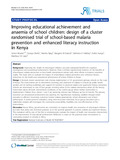Improving educational achievement and anaemia among school children: design of a cluster randomised trial of school-based malaria prevention and enhanced literacy instruction in Kenya

View/
Date
2010-10-07Author
Brooker, Simon
Okello, George
Njagi, Kiambo
Dubeck, Margaret M
Halliday, Katherine E
Inyega, Hellen
Jukes, Matthew CH
Type
Journal ArticleMetadata
Show full item recordAbstract
Abstract
Background
Improving the health of school-aged children can yield substantial benefits for cognitive development and educational achievement. However, there is limited experimental evidence on the benefits of school-based malaria prevention or how health interventions interact with other efforts to improve education quality. This study aims to evaluate the impact of school-based malaria prevention and enhanced literacy instruction on the health and educational achievement of school children in Kenya.
Design
A factorial, cluster randomised trial is being implemented in 101 government primary schools on the coast of Kenya. The interventions are (i) intermittent screening and treatment of malaria in schools by public health workers and (ii) training workshops and support for teachers to promote explicit and systematic literacy instruction. Schools are randomised to one of four groups: receiving either (i) the malaria intervention alone; (ii) the literacy intervention alone; (iii) both interventions combined; or (iv) control group where neither intervention is implemented. Children from classes 1 and 5 are randomly selected and followed up for 24 months. The primary outcomes are educational achievement and anaemia, the hypothesised mediating variables through which education is affected. Secondary outcomes include malaria parasitaemia, school attendance and school performance. A nested process evaluation, using semi-structured interviews, focus group discussion and a stakeholder analysis will investigate the community acceptability, feasibility and cost-effectiveness of the interventions.
Discussion
Across Africa, governments are committed to improve health and education of school-aged children, but seek clear policy and technical guidance as to the optimal approach to address malaria and improved literacy. This evaluation will be one of the first to simultaneously evaluate the impact of health and education interventions in the improvement of educational achievement. Reflection is made on the practical issues encountered in conducting research in schools in Africa.
Trial Registration
National Institutes of Health NCT00878007
URI
http://dx.doi.org/10.1186/1745-6215-11-93http://erepository.uonbi.ac.ke:8080/xmlui/handle/123456789/14725
